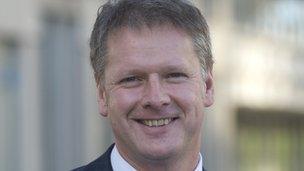Lewis 'must back uni funds reform,' vice chancellor says
- Published
There is a big week ahead for new Education Minister Huw Lewis
Wales' new education minister needs to review tuition fees and ensure Welsh universities have funds matching those in England, says a university head.
Prof Colin Riordan, Cardiff University's vice chancellor, said the sector needs Huw Lewis to back funding reforms aimed at attracting students.
Mr Lewis took up his post after the shock resignation of Leighton Andrews.
Prof Riordan said some courses in Wales bring in £1,500 less per student than similar ones at English universities.
Mr Lewis introduces his first piece of legislation as part of his new portfolio, the Education (Wales) Bill in the Welsh assembly next week.
He will also make a statement on the new exam regulator, Qualifications Wales.
Those are just two of the issues in the former teacher's ministerial in-tray.
Further and higher education are key drivers to economic growth with their roles in building a highly skilled workforce that can compete internationally.
Speaking to the BBC's Sunday Politics Wales show, Prof Riordan says Welsh universities need the minister to support them in reforming the funding system to allow them to attract students.
He said: "Universities that teach high cost subjects - things like engineering or areas like chemistry or physics [with] the very high costs associated with these because of labs and equipment - English universities currently get about £1,500 per student more than we do."
Welsh students pay fees of no more than £3,500 wherever they study in the UK, with the Welsh government paying the difference - which can be £5,000 per student.
The vice chancellor said: "I can see that's a very helpful policy for students that are domiciled in Wales.
"The unfortunate by-product of that is that effectively the Welsh government ends up funding English universities and I'm sure that wasn't the intention originally of the money that was transferred to Wales from the UK Treasury."

Prof Colin Riordan wants to see a cross-party review of Wales' tuition fee policy
He wants to see a review of tuition fees, preferably on a cross-party basis, after the next election.
There are also calls for a change in approach in schools policy from the new minister for education.
The Welsh government has had to intervene in six council areas because their schools needed extra attention.
These special measures range from providing an action plan for improvement to sending in commissioners to take over the running of the education departments.
Mr Lewis will need to decide how to respond to the Hill Report that called for the 22 education services running schools in Wales to be cut by a third, in favour of larger regional management groups.
David Evans, of NUT Cymru, Wales' largest teaching union, said there was a "general consensus that 22 is too many" and there was a need for a "more streamlined process" while retaining local accountability.
Teaching unions have been in dispute with the Welsh government over some of its policies particularly the banding of schools to allow better monitoring and the reintroduction of testing young children.
These have been introduced after Wales slipped down the Pisa league tables, an international assessment of school pupils.
Mr Evans said: "Everyone involved with education in Wales wants the best. Yes the PISA results aren't the best but PISA results aren't the be all and end all."
Sunday Politics Wales is on BBC One Wales at 11:00 BST on Sunday 30 June.
- Published19 March 2013
- Published2 October 2012
- Published13 September 2012
- Published14 November 2011
- Published9 May 2011